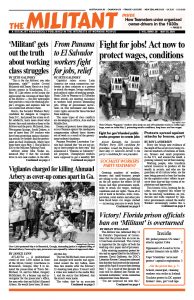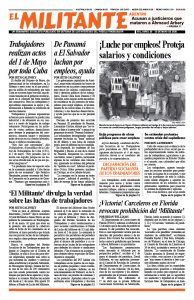Capitalist rulers across Latin America are using coronavirus outbreaks in their countries as a pretext to attack the wages, living conditions and political rights of working people. From Chile to Panama to El Salvador these attacks are meeting resistance as workers hold protests demanding jobs, lifting of government restrictions on free movement and democratic rights and aid for those blocked from working.
The same types of class conflicts are developing in Africa, Asia and the Middle East.
Dozens of protests have taken place across Panama against the inadequate compensation offered those thrown out of work as a result of the government-ordered shutdown.
Panama President Laurentino Cortizo had claimed that “we are not going to leave people on their own” and announced a “Panama in Solidarity” aid program. Unemployed workers were supposed to get a monthly $80 “bonus” plus a free food bag — but the government hasn’t delivered.
In response, residents in San Miguelito and in Pacora, east of Panama City, blocked roads with tires, branches and stones, including on some of the most heavily transited highways, ignoring government orders to “stay in your home,” reported Crítica newspaper. Similar actions took place in Chiriquí in the far western part of the country.
“The slogan was the same everywhere,” the paper reported. “The lack of delivery of the bonuses and food bags.”
Some of the roadblocks stayed up for 12 hours. CNN showed the cops attacking protests and arresting participants.Edith de Bonilla, a community leader in San Miguelito, told the press that officials insulted them for demanding aid. The residents aren’t “parasites,” she said, but street vendors and other “informal workers” who have been blocked from their livelihood by the government measures.
Hundreds of thousands have been unable to work since March 18 when the government imposed a nationwide curfew and shut down most businesses, including restaurants, hotels, small businesses and mines.
“We are more afraid of hunger than the virus,” protesters told CNN reporter Elizabeth González May 4.
“The bag of food isn’t even worth $15. It only lasts one day,” said one woman. “They want to give us one bag of food for each house. But in that house there are seven families!”
CNN reported that almost half of Panamanians work in the “informal sector,” ineligible for the bonus.
In an attempt to cow working people, the government has been stepping up its enforcement of the curfew. TVN-2 news reported 561 people were arrested May 7 alone.
In Chile, President Sebastián Piñera used the virus to push back the nearly daily demonstrations that exploded against his regime in October over low wages and the high cost of living. Chilean health officials have banned gatherings of more than 50 people, closed bars and restaurants, and imposed nightly curfews.
On April 3, soon after lockdown was declared, Piñera had himself photographed posing in an empty Plaza Italia, a central rallying point in the capital Santiago for many of the mass demonstrations organized against his regime, as if celebrating the end of the protests.
On April 27 some 200 people tried to protest in the plaza and were dispersed by police using high-pressure water and teargas. At a May Day protest there the cops arrested 57 people, including some members of the news media.
One popular sign at some of the actions was “the Piñeravirus is more dangerous than the coronavirus.”
Draconian measures in El Salvador
El Salvador has imposed some of the most draconian anti-worker measures since the start of the pandemic. Cops have detained more than 2,300 people on charges of violating the mandatory home quarantine decreed by President Nayib Bukele — despite a Supreme Court ruling against the decree.
Some 160 people locked up at a sports center in San Salvador protested May 4. They complained they hadn’t been allowed to return home even though they have been locked up for 40 days.
At another detention center in a Baptist church in San Salvador, those detained shouted from the windows, “We just want to be with our families.” They also complained about overcrowding and unsanitary conditions. Cops with shields and billy clubs pushed the quarantined prisoners back.
Bukele won the presidency by presenting himself as the alternative to widespread political corruption. He got some support among workers by posing as tough on crime. On April 25 the government forced hundreds of alleged gang members in the Izalco prison, stripped to their underwear with their hands tied behind their backs, to sit spread-eagled, row after row, almost in each other’s laps.
When some human rights groups objected, Bukele cynically charged that “it is incredible, the international support that the gangs have.”
Working people have taken to the streets to protest the lack of aid for those thrown out of work. On May 4, workers laid off from the Yasaki auto harness factory in Santa Ana protested. “It’s been two weeks without getting our salary,” one of them told La Prensa Gráfica.

